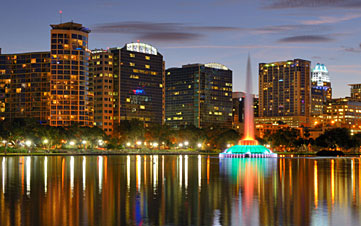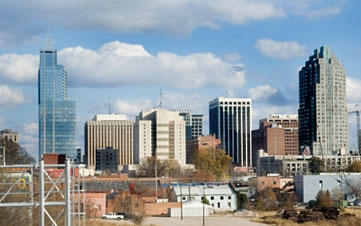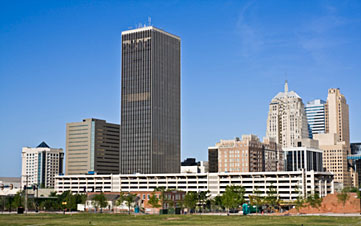8 Cities with Surprising Job Growth
Though we expect job creation nationwide to continue its sluggish pace, some areas will fare much better than others.


Profit and prosper with the best of Kiplinger's advice on investing, taxes, retirement, personal finance and much more. Delivered daily. Enter your email in the box and click Sign Me Up.
You are now subscribed
Your newsletter sign-up was successful
Want to add more newsletters?

Delivered daily
Kiplinger Today
Profit and prosper with the best of Kiplinger's advice on investing, taxes, retirement, personal finance and much more delivered daily. Smart money moves start here.

Sent five days a week
Kiplinger A Step Ahead
Get practical help to make better financial decisions in your everyday life, from spending to savings on top deals.

Delivered daily
Kiplinger Closing Bell
Get today's biggest financial and investing headlines delivered to your inbox every day the U.S. stock market is open.

Sent twice a week
Kiplinger Adviser Intel
Financial pros across the country share best practices and fresh tactics to preserve and grow your wealth.

Delivered weekly
Kiplinger Tax Tips
Trim your federal and state tax bills with practical tax-planning and tax-cutting strategies.

Sent twice a week
Kiplinger Retirement Tips
Your twice-a-week guide to planning and enjoying a financially secure and richly rewarding retirement

Sent bimonthly.
Kiplinger Adviser Angle
Insights for advisers, wealth managers and other financial professionals.

Sent twice a week
Kiplinger Investing Weekly
Your twice-a-week roundup of promising stocks, funds, companies and industries you should consider, ones you should avoid, and why.

Sent weekly for six weeks
Kiplinger Invest for Retirement
Your step-by-step six-part series on how to invest for retirement, from devising a successful strategy to exactly which investments to choose.
Though we expect job creation nationwide to continue its sluggish pace, some areas will fare much better than others.
Here are eight metropolitan areas that we think are poised to become job-creating machines in the years ahead.
We zeroed in on metro areas of at least 1 million people and a track record of above-average population and job growth coming out of the 2008-2009 recession.
Our analysis also considers demographic trends and industry growth that point to rapid job creation. We think each of these eight cities will outpace the nation's 7% job growth average between now and 2017, a forecast based on U.S. Department of Labor projections plus our reporting.
They're not the usual suspects -- the Houstons, Austins and Seattles that are riding high because they're well-known homes to lots of energy or tech firms. Take a look:

Nashville
Metro area population:
1.6 million
Current unemployment rate: 6.5% (vs. 8.2% nationally)
Job growth next five years: 18%
Number of new jobs: 140,000
Nashville wins the prize for fastest two-year job growth among all the metro areas on our list -- four times as fast as the U.S. as a whole. Vanderbilt University, the largest employer, will continue to add a variety of health care, education and service jobs. Nissan North America will add manufacturing jobs at its auto assembly plant and office jobs at its Nashville-area headquarters.
The capital of country music has a vibrant tech sector fueled by its highly regarded universities, and is becoming a center of data processing functions for cloud computing. The city will continue to be the freight transportation center for the state and the region, adding thousands of service jobs. It's the crossroads for truck and rail transport and a major center for UPS operations by land and air.

San Antonio
Metro area population:
2.2 million
Current unemployment rate: 6.2%
Job growth next five years: 16%
Number of new jobs: 150,000
Sure, nearby Austin, the state capital, is booming, but San Antonio's metro area is 20% larger in population and will add jobs nearly as fast over the next five years. Cheaper housing and commercial space lure many high-tech companies toward San Antonio, and the city is the hub of Central Texas' energy sector, especially its fast-growing natural gas segment. Major employers poised to expand include Valero, NuStar and Tesoro. Meanwhile, insurer USAA is the area's largest and fastest-growing private employer.

Orlando, Fla.
Metro area population:
2.2 million
Current unemployment rate: 8.2%
Job growth next five years: 15%
Number of new jobs: 150,000
The East Coast home of Mickey Mouse will be the fastest-growing job market of three Florida cites recovering most quickly from the state's housing crash. (The other two are Jacksonville and Fort Lauderdale.) Disney, Universal and new resorts and hotels will dominate job growth, but health care is the fastest-growing industry, creating a wide array of professional, transportation, sales and personal service jobs.
High tech is a surprisingly large and growing sector in Orlando. AT&T and Siemens are major employers. But Lockheed Martin, which employs 13,000 people, will be cutting jobs now that NASA's Space Shuttle program has ended.

Raleigh, N.C.
Metro area population:
1.2 million
Current unemployment rate: 7.4%
Job growth next five years: 14%
Number of new jobs: 75,000
Raleigh and its environs will continue to be a magnet for high-tech and biotech job creation. Major employers adding the most jobs will be Duke University, the University of North Carolina, IBM, Cisco, GlaxoSmithKline, Nortel, Verizon and Lenovo. As the capital of a state with healthy finances, Raleigh will also steadily add government jobs. Moreover, it's a regional hub for the U.S. Environmental Protection Agency, supporting thousands of related private-sector jobs.

Portland, Ore.
Metro area population:
2.2 million
Current unemployment rate: 7.8%
Job growth next five years: 12%
Number of new jobs: 130,000
After devastating job losses in the recession, Portland has made a spectacular recovery, fueled by the tech mini-boom and the area's attractiveness to young people. Anchored by Intel and its 16,000 employees, Portland will maintain its moniker as the Silicon Forest for its more than 1,200 high-tech firms, most of them small to medium-size.
High tech will continue to be the fastest-growing sector, but other major job gains will come in sportswear. The presence of Nike, Adidas and Columbia Sportswear has spawned many smaller sportswear-related firms that are hiring designers, marketers and salespeople. The industry has also given rise to a vibrant graphic design sector. Portland, the third-largest seaport on the West Coast, will also continue to grow as a major transportation and shipping center.

Oklahoma City
Metro area population:
1.3 million
Current unemployment rate: 4%
Job growth next five years: 10% to 12%
Number of new jobs: 50,000 to 70,000
The nation's natural gas boom is propelling Oklahoma City's growth. The area is home to large gas firms Devon Energy and Chesapeake Energy, as well as scores of privately held exploration and energy services outfits, such as Kirkpatrick Oil and Mustang Fuel. It's also the state capital and the site of Oklahoma State University and the University of Oklahoma's medical school, all large and growing employers.

Phoenix
Metro area population:
4.3 million
Current unemployment rate: 6.6%
Job growth next five years: 8% to 10%
Number of new jobs: 100,000 to 150,000
A solid transportation infrastructure and low labor costs make the Valley of the Sun a strong magnet for firms fleeing higher-cost California. The Greater Phoenix Economic Council notes that 30% of relocations in 2011 were from California. And a silver lining in the wake of the housing crash: inexpensive real estate.
The city is an emerging player in the making and distribution of lower-end electronics: major employers include Motorola, Honeywell and Avnet, all of which are hiring. Other Fortune 500 firms looking for help are mining giant Freeport-McMoRan, US Airways and PetSmart.

Atlanta
Metro area population:
5.4 million
Current unemployment rate: 8.5%
Job growth next five years: 8%
Number of new jobs: 180,000
It won't expand as fast as the others on our list, but Atlanta's size and diversity will make it a good place to relocate and look for work. One key to Atlanta's bright future is the nexus between transportation and online retailing. UPS and AT&T Mobility, with its 100 million wireless customers, are both based there, and they will be key players in America's consumer-spending shift from bricks to clicks.
Home Depot, UPS, Coca-Cola, and Delta Airlines are among Fortune 500 giants based in Atlanta. Delta Airlines and AirTran are likely to shrink their workforces, as is struggling retailer Home Depot. But regional energy giant Southern Co. and Newell Rubbermaid, maker of many things for the kitchen and garage, see expansions.

More from Kiplinger
10 Great Cities for Starting a Business
7 Fast-Growing Franchises with Staying Power
QUIZ: Test Your Start-Up Know-How
Profit and prosper with the best of Kiplinger's advice on investing, taxes, retirement, personal finance and much more. Delivered daily. Enter your email in the box and click Sign Me Up.

-
 5 Vince Lombardi Quotes Retirees Should Live By
5 Vince Lombardi Quotes Retirees Should Live ByThe iconic football coach's philosophy can help retirees win at the game of life.
-
 The $200,000 Olympic 'Pension' is a Retirement Game-Changer for Team USA
The $200,000 Olympic 'Pension' is a Retirement Game-Changer for Team USAThe donation by financier Ross Stevens is meant to be a "retirement program" for Team USA Olympic and Paralympic athletes.
-
 10 Cheapest Places to Live in Colorado
10 Cheapest Places to Live in ColoradoProperty Tax Looking for a cozy cabin near the slopes? These Colorado counties combine reasonable house prices with the state's lowest property tax bills.
-
 What to Do With Your Tax Refund: 6 Ways to Bring Growth
What to Do With Your Tax Refund: 6 Ways to Bring GrowthUse your 2024 tax refund to boost short-term or long-term financial goals by putting it in one of these six places.
-
 What Does Medicare Not Cover? Eight Things You Should Know
What Does Medicare Not Cover? Eight Things You Should KnowMedicare Part A and Part B leave gaps in your healthcare coverage. But Medicare Advantage has problems, too.
-
 15 Reasons You'll Regret an RV in Retirement
15 Reasons You'll Regret an RV in RetirementMaking Your Money Last Here's why you might regret an RV in retirement. RV-savvy retirees talk about the downsides of spending retirement in a motorhome, travel trailer, fifth wheel, or other recreational vehicle.
-
 The Six Best Places to Retire in New England
The Six Best Places to Retire in New Englandplaces to live Thinking about a move to New England for retirement? Here are the best places to land for quality of life, affordability and other criteria.
-
 The 10 Cheapest Countries to Visit
The 10 Cheapest Countries to VisitWe find the 10 cheapest countries to visit around the world. Forget inflation and set your sights on your next vacation.
-
 15 Ways to Prepare Your Home for Winter
15 Ways to Prepare Your Home for Winterhome There are many ways to prepare your home for winter, which will help keep you safe and warm and save on housing and utility costs.
-
 Six Steps to Get Lower Car Insurance Rates
Six Steps to Get Lower Car Insurance Ratesinsurance Shopping around for auto insurance may not be your idea of fun, but comparing prices for a new policy every few years — or even more often — can pay off big.
-
 How to Increase Credit Scores — Fast
How to Increase Credit Scores — FastHow to increase credit scores quickly, starting with paying down your credit card debt.
